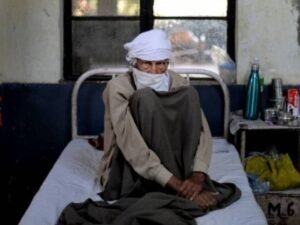A patient from TB clinical trial outside his home in Johannesburg
The results of ZeNix, a Phase 3 clinical trial that took place in 11 sites across Georgia, Moldova, Russia, and South Africa, revealed that the BPaL treatment remains effective against highly drug-resistant strains of tuberculosis (TB) with reduced dosage and/or duration of the linezolid component of the regimen. Along with the maintenance of efficacy, there was a decrease in linezolid-associated side effects that accompanied the reduced dosage or duration of linezolid.1 The results from the trial, which was led by TB Alliance, a non-profit TB drug developer, were published today in the New England Journal of Medicine.
The BPaL regimen — which combines the antibiotics bedaquiline (B), pretomanid (Pa) and linezolid (L)—received its first regulatory approval by the United States Food and Drug Administration in August 2019 as a six-month, three-drug, all-oral regimen for the treatment of people with multidrug-resistant TB who are treatment intolerant or non-responsive as well as extensively drug-resistant TB (as defined by WHO prior to 2021).2 Historically, treatment of such forms of TB would take 18 months or longer, with a reported global success rate of 52%.3,4 BPaL has now been procured by more than 30 countries around the world. The World Health Organization also recently published a Rapid Communication ahead of updated drug-resistant TB treatment guidelines based on clinical evidence of pretomanid-containing regimens that will allow almost all DR-TB patients to be treated in six-months with an all-oral regimen.5
“These results add to the substantial evidence base for the efficacy and safety of the BPaL regimen and will enable care providers to further optimize the use of the regimen,” said Mel Spigelman, M.D., President and CEO of TB Alliance, which developed pretomanid and pioneered the use of the regimen. “We will continue to innovate and fight for access until the days of lengthy and highly toxic therapies are over for every person with TB.”
ZeNix was a four-arm, randomized study that enrolled 181 participants. Of these participants, 36 (20%) were HIV positive. Participants were treated for six months with bedaquiline, pretomanid and varying doses and durations of linezolid, with follow-up until the primary endpoint six months after completion of treatment. The study, which was double-blinded as to the dosage and duration of linezolid, sought to evaluate whether the efficacy of the BPaL regimen could be maintained while reducing a patient’s exposure to linezolid and its associated side effects.
Participants were diagnosed with either extensively drug-resistant (XDR-) TB, pre-XDR-TB, or failed or treatment-intolerant multidrug-resistant TB.* Per the modified intent to treat analysis, the success rate for participants receiving the highest dosage of linezolid (1200mg for six months) was 93%.1 The efficacy level was similarly high in the remaining arms, reported as 89% among participants receiving 1200mg of linezolid for two months, 91% for those receiving 600mg of linezolid for six months, and 84% among those receiving 600mg of linezolid for two months.1 Dosing of bedaquiline and pretomanid was consistent across the four arms.1 These findings are consistent with the 90% success rate of the BPaL regimen in the Nix-TB trial, which used 1200mg for six months linezolid dosage. The results of the Nix-TB trial were published in the New England Journal of Medicine in March 2020.
Adverse reactions reported in at least 10% of trial ZeNix participants included peripheral neuropathy (38% of those receiving 1200mg of linezolid for six months; 24% of those receiving 1200mg of linezolid for two months; 24% of those receiving 600mg of linezolid for six months; 13% of those receiving 600mg of linezolid for two months).1 An evaluation of myelosuppression, as manifest as anemia, found that patients had decreased hemoglobin levels related to linezolid exposure (22% of those receiving 1200mg of linezolid for six months; 17% of those receiving 1200mg of linezolid for two months; 2% of those receiving 600mg of linezolid for six months; 7% of those receiving 600mg of linezolid for two months).1
“The results of this study reaffirm the potential of this regimen. It’s encouraging to confirm that we can continue to offer patients a high likelihood of rapid cure while further improving the treatment experience,” said Francesca Conradie, M.D., principal investigator for the ZeNix clinical trial as well as South Africa’s Clinical Access Program for the regimen.
Data from ZeNix contributed to a May 2022 rapid communication from the World Health Organization indicating new guidelines that will enable countries to treat virtually all patients with DR-TB with BPaL-based regimens.
A letter from the U.S. CDC and Southeastern National TB Center was also published in the same issue, describing the treatment experience of the first 20 patients reported on BPaL in the United States. The letter indicated that, by 12 months after initiation, 19 (95%) patients had completed therapy with no treatment failures, recurrences, or death.





